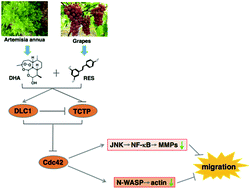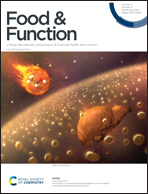Combination of dihydroartemisinin and resveratrol effectively inhibits cancer cell migration via regulation of the DLC1/TCTP/Cdc42 pathway
Abstract
Resveratrol (RES) is a polyphenolic plant antitoxin that increases the level of the tumor suppressor gene deleted in liver cancer 1 (DLC1) to suppress cancer progression. Dihydroartemisinin (DHA), a main active metabolite of anti-malarial drug artemisinin (ART), inhibits cancer cell invasion and migration by decreasing the translationally controlled tumor protein (TCTP), as reported in a few literature studies. Compelling evidence has shown that combination therapy with two or more compounds is more effective than treatment with a compound alone. However, the mechanism of combination of DHA and RES on inhibition of cancer cell migration has not been reported. In this study, our results showed that combination of DHA and RES, compared to each compound alone, synergistically inhibited migration along with the decrease of wound closures and F-actin formation in HepG2 and MDA-MB-231 cancer cells. This combination treatment up-regulated DLC1 and down-regulated TCTP expressions significantly. The two proteins were identified to colocalize in focal adhesions and form a complex. Depletion of DLC1 increased TCTP expression, and transfection with either GFP-DLC1-WT or GFP-DLC1-R718A (GAP-dead mutant) decreased the TCTP level markedly, indicating that DLC1 negatively regulated TCTP in a RhoGAP-independent manner. Furthermore, this combination treatment impeded the migration of HepG2 and MDA-MB-231 cancer cells via Cdc42 regulating JNK/NF-κB and N-WASP signaling pathways, and knockdown of DLC1 obviously increased the levels of Cdc42 and the molecules related to both signaling pathways in MDA-MB-231 cells. The combination also effectively inhibited the growth of xenograft tumors in an avian embryo model. In sum, we reveal a novel combination of DHA and RES that inhibits cancer cell migration by modulating the DLC1/TCTP axis to hinder the Cdc42 related signaling pathway. This combination treatment may be a promising therapeutic strategy to inhibit cancer cell migration by targeting DLC1 and TCTP.

- This article is part of the themed collection: Food & Function Recent HOT articles


 Please wait while we load your content...
Please wait while we load your content...